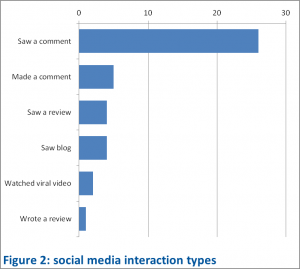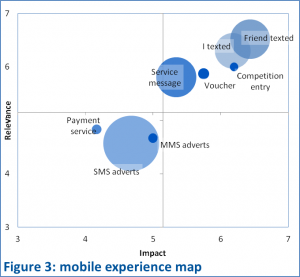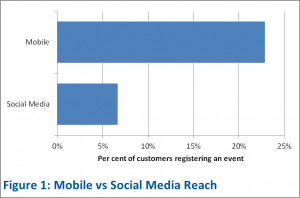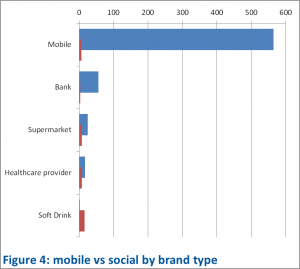Which new channel is winning with the customer?
Given the current hype about social media as a marketing channel I thought it might be nice to see how our respondents in the Pleased to Meet You survey responded to this channel. In particular we will compare it to the mobile channel which was previously flavour of the month but seems to have lost its sheen.
An initial look at the number of our participants that interacted with one of their core brands1 over the four week study period paints a very clear picture:
Only 35 participants out of nearly 500 registered any social media interaction to do with these core brands in the period. This despite the fact over 70% of participants registered some form of online interaction in that period. On the other hand, nearly a quarter of participants registered some form of mobile interaction and not only from their mobile providers as we shall discover later.
Social Media mix
 Diving in to social media in more detail, the obvious questions to ask are:
Diving in to social media in more detail, the obvious questions to ask are:
- Is the contact directly with the brands?
- Is it active (engaging) or passive (viewing)?
As can be seen in figure 2 seeing a comment on a social media site was the largest category and a review of the participants’ comments reveal that this is largely direct engagement with the brand. However, the majority of social media engagement is very much of passive rather than active. Of concern though, we find that where active social media engagement occurs it happens away from the brands social sites on public forum.
Mobile Marketing Mix
When we take a deeper look at the mobile communications people engaged in, we gain some interesting insights into what works well, and where mobile is weaker.
Whilst advertisements are the largest single type of contact, accounting for about 40% of total contacts, they are not that well received. Comments from the participants indicated that they found SMS adverts to be repetitive, poorly targeted, and quite interruptive.
 On the other hand, customer service texts informing participants of issues like bank balances, new bills online, hospital appointments, and the need to top up pre-paid phones were received extremely positively.
On the other hand, customer service texts informing participants of issues like bank balances, new bills online, hospital appointments, and the need to top up pre-paid phones were received extremely positively.
Of great interest to marketers should be the evidence that participants were regularly using phones to discuss products they were buying, and offers that were available, and it could be that with development this channel could provide an excellent vehicle to propagate well targeted offers virally. Critical to this will be the identification of social leaders who act as central points in mobile social communities, and the active bridges between communities.
The final finding from the research that we need to look at is that whilst mobile does seem to currently be the more effective channel, this does not hold for all the brands we looked at in the research. Consumer goods brands, here represented by soft drinks, struggle to use mobile as a channel in the absence of direct customer contacts. For these brands social media offer the opportunity to directly engage with their consumers in a way they never previously could, and this is reflected in higher number of social media compared to mobile contacts that participants registered for soft drinks.
Mobile or Social the winner is clear
So in conclusion, as marketers we need to pay much more attention to mobile as a channel. However if it is to become an effective marketing channel we need to do far more work in improving the relevance and quality of our communications through this channel. The public do not currently show any great appetite to engage with brands through social media. Consequently I would be careful of investing heavily in this channel at the moment although though this may change in the future.
1) core brand types: bank, supermarket, mobile provider, soft drink, and healthcare provider)




